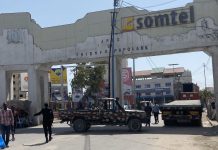Mogadishu (UM) – The story of the week is that the biggest market in Somalia, the Bakara market, remains closed as a result of trader’s protest against the new sales tax imposed by the Ministry of Finance. However, this is not true: many of the traders are selling their goods and services from the Bakara market and only some traders are participating in the boycott. Additionally, despite some traders boycotting the payment of the sales tax at Mogadishu Port, many more have decided to pay and are now taking their goods out of the port and to the many markets of Mogadishu.
The Ministry of Finance has argued that sales tax of 5% is legally binding in Somali law and it remains steadfast in its commitment to collecting it. This strong political will is uniform across the government with the Prime Minister reiterating to business leaders to pay their fair share to rebuild Somalia. The political will and clear stance of the Federal government of Somalia is admirable and is likely to yield results but in case it ever wanes, there is always the disastrous possibility of failing the International Monetary Fund’s Staff Monitored Program (SMP) to sharply focus minds again.
Somali businesses have played an important role in keeping the Somali nation and people alive through the most difficult periods in Somali history. They invested at a time most ran way and turned their backs on the Somali people. This, supported by diaspora remittances, has allowed for the Somali economy to grow and provide goods and services that still remain crucial for the Somali people. However, in this period of lawlessness and statelessness, many Somali business operating today profited enormously without paying taxes officially to any government. Most they paid were negotiated fees for political purposes. The term “millionaire in a day” was coined in Somalia and not Silicon Valley where technology invented there is continuously producing billionaires overnight.
On the part of the Somali government, there is a need to win public trust. The governments of the past had not been serious about good governance and to this day there are senior politicians, including sitting Parliamentarians and Ministers, who are involved in private enterprise which contradicts the Ministerial code of ethics. The recent cancellation of revenue collection contracts by the Ministry of Finance saw MP’s and Ministers reveal themselves as shareholders and actively campaign for these entities to remain operating despite not registering this when they took their oath of office. This situation should soon be addressed by the Company Law which was passed by the Cabinet today. This will be supported by the Anti-Corruption Bill which when implemented will criminalize the persistent bribery and conflict of interest that remains the real obstacle to transparency and good governance in Somalia. In the meantime, a culture of transparency and trust must be fostered between the government and the private sector. Both need each other and the current stand-off is helping neither side.
On their part, the Ministry of Finance has made clear through Minister Beileh that they will be accountable to the public for every dollar collected in revenue. Thus far, they have honoured this and the Somali people must trust them again with their taxes to finance their future. The payment of 5% sales tax is not the real concern of the Somali businesses but more the path of reform that the government has finally embarked on. More than any government before it, this administration led by President Mohamed Abdullahi Mohamed Farmaajo, is very serious about financing Somalia’s future from domestic resource and ending the shameful practice of persistently begging the international community to protect it, feed it and rebuild it. This is clearly is not working and will never work: Only Somalis can rebuild this beautiful, rich land of opportunity for their own benefit.
The Somali businesses will serve their interests best if they comply with the law and pay the 5% sales tax. The payment of this legally binding tax must be accompanied by the payment of many others, including, corporation and income tax among others. For many of the Somali businesses, they have had over 25 years of tax free existence and today they must realize that this must come to an end. On the other hand, the Somali Federal government must provide public services with collected revenues and expand the tax base to include the federal member states which contribute nothing to the central government budget at present.
The 5% sales tax is collected at the Port because the government is unable to collect it from the shops directly due to insecurity according to the Ministry of Finance. However, the whole episode has caused unnecessary disruption to the Somali people’s lives as a result of misinformation. Some business leaders are still spreading false rumors about the tax and even claimed the Somali people will starve as a result. This is not true because food is not included in the sales tax. The Somali government must hit back at these irresponsible traders with comparative facts like how much these same people pay to do business in other neighboring countries like Kenya and Uganda. This, and how willingly they pay, will shock the Somali people.
Sadly, it is also a fact that those that have lived abroad and understand the importance of taxes are misleading the Somali people into thinking they do not need to pay. These people must be named and shamed and reported to their “other governments” that they fear so much.
On the issue of tax payment in general, a question that all Somalis must ask themselves is how they can expect to live on donor citizen’s taxes while refusing to pay for their future themselves? This is an offence to the pride, entrepreneurship and ethics of hard work Somalis are known for globally.



























